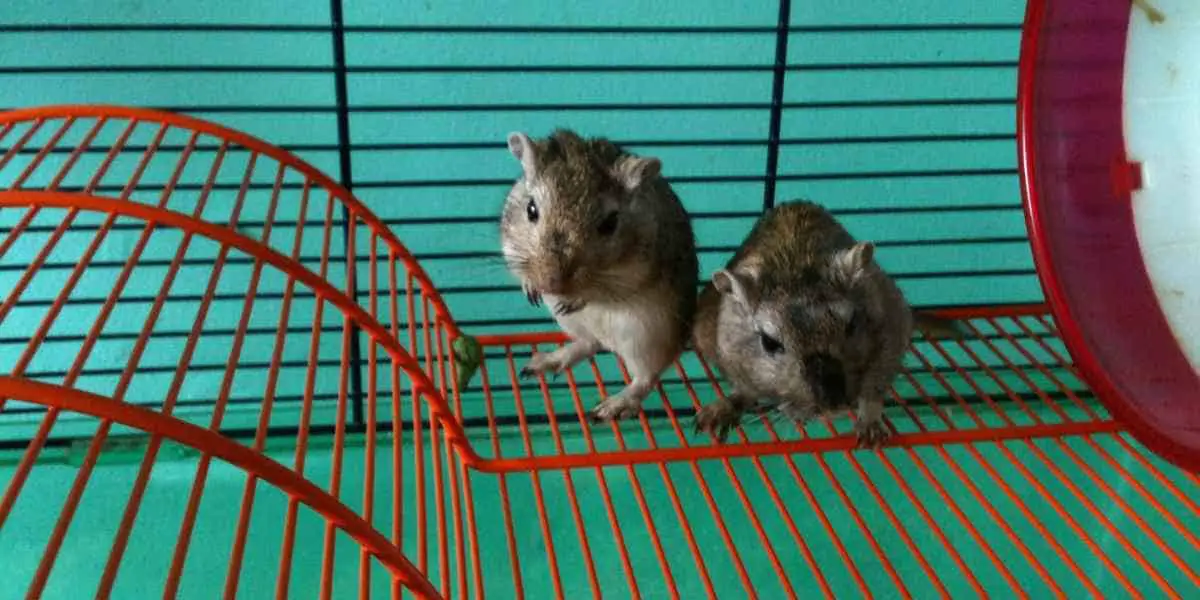For a fresher-smelling gerbil environment, consider a sand bath—it’s their natural way of staying clean! To maintain an odor-free gerbil cage, regularly spot clean to remove any traces of urine and droppings. Give your gerbil’s toys a gentle wash with soapy water weekly. Be cautious: full cage cleanouts might disrupt their scent-based bonds, potentially leading to conflicts. Keep it fresh, but familiar!
Table of Contents
Key Takeaways:
- Regular cleaning and care are essential for minimizing gerbil smell.
- Gerbils have adapted to reduce odor through various natural mechanisms.
- Avoid using air fresheners in gerbil cages to maintain their natural scent.
- Spot cleaning and changing bedding regularly can help prevent odor buildup.
- Utilize absorbent bedding materials and ensure proper ventilation to reduce gerbil smells.
- Ozone-free air purifiers and odor-elimination products can aid in keeping the cage clean and odor-free.
- Regular cleaning, proper hygiene, and monitoring of gerbil health are key to preventing and minimizing gerbil smells.
Understanding Gerbil Odor and its Causes
When comparing small pets, gerbils and hamsters stand out. Yet, gerbils have an edge when it comes to odor. They’ve adapted to conserve much water, resulting in them urinating less often, which means the smell of urine is less pronounced than in other rodents. Their poop is small and hard, and they don’t produce as strong a smell as one might think. Instead of marking territories with the distinct smell of urine, gerbils scent mark by rubbing their bellies on objects using their scent glands, which means gerbils don’t smell as bad as you’d imagine.
You might wonder, “How can I keep my gerbil cage from giving off a bad smell?” Here’s the scoop: To ensure your gerbils don’t smell bad, regular maintenance of their environment is crucial. Clean your gerbil’s cage often, but avoid using cage sprays or air fresheners inside the cage. They can confuse gerbils and cover their natural scents. Instead, use water and soap for cleaning. After scrubbing, rinse the base of the cage with hot soapy water and leave for 15 minutes. Don’t bathe your gerbil in water bowls, as they prefer sand baths. Gerbils love a good sand bath; it’s their way of staying fresh, and it’s a sight many gerbil owners adore!
It’s essential to remember that while gerbils smell less than hamsters, they still have a distinctive scent. Keeping gerbils healthy involves providing the right gerbil food, ensuring they eat and drink adequately, and regularly emptying the cage. Regular spot cleaning around the cage to prevent bad smell buildup and ensure good ventilation can significantly reduce the smell. Products like disinfectants can aid in this quest. Plus, a good sand bath not only keeps gerbils clean but also entertains them.
Lastly, as a pet owner, monitoring the health of your pet is paramount. If your gerbils live in a dirty environment, they’re prone to illnesses. By keeping gerbils from smelling bad, you’re also ensuring they stay happy and healthy.
| Key Points: |
|---|
| Gerbils conserve water, resulting in less frequent urination and smaller, less odorous feces. |
| Spot cleaning and regular bedding changes can help prevent odor buildup. |
| Avoid using air fresheners in the gerbil cage to maintain their natural scent. |
| Utilize absorbent bedding materials and ensure proper ventilation to reduce gerbil odors. |
| Consider using odor-elimination products such as disinfectants and cage fresh granules. |
Proper Cleaning and Maintenance for Gerbil Cages
Regular cleaning and maintenance of your gerbil’s cage aren’t just essential for aesthetics—it’s pivotal for their well-being. Gerbils have a nifty adaptation to conserve water, which means they don’t visit the “loo” as often as some other rodents. This results in less frequent urination and droppings that are small and hard—attributes that make gerbils smell less offensive than their rodent cousins. But if you’ve ever thought, “Why does my pet’s cage have that distinctive scent?”, it’s often due to neglecting some cleaning habits.
Spot cleaning should be your daily mantra to ensure gerbils get the clean environment they thrive in. Remove soiled bedding, uneaten food, and droppings daily. Using gloves and a scooper ensures you don’t smell like a gerbil by the end of it! Male gerbils, in particular, can sometimes produce a more noticeable odor, so be sure to monitor the cleanliness more intently if you have two gerbils or more.
While it’s tempting to do a complete overhaul and clean every part of the cage, this can be counterproductive. Gerbils have a keen sense of smell, and wiping away all their familiar scents can stress them out. So, don’t spray the cage with air fresheners or give them water baths; gerbils don’t bathe in water. Instead, let them take a sand bath. Refresh the bedding every 4-6 weeks to strike the right balance between cleanliness and comfort. If you’re wondering how often to clean a gerbil’s cage in its entirety, err on the side of less frequently to avoid upsetting their scent-based social dynamics.
Remember, the main reasons gerbils might develop a bad odor are neglect and a lack of understanding of their unique needs. Keep these tips in mind, and your gerbil’s habitat will remain a fresh, stress-free zone.
| Cleaning Tips | Frequency |
|---|---|
| Spot cleaning (removing waste) | Daily |
| Changing bedding | Every 4-6 weeks |
| Washing toys and accessories | Monthly |
In addition to regular cleaning, it is also important to keep the cage well-ventilated. Good airflow helps to dissipate any remaining odors and keeps the gerbil’s environment fresh. You can achieve this by placing the cage in a well-ventilated area and using a wire mesh lid rather than a solid one.
Remember, a clean and odor-free gerbil cage is not only beneficial for your gerbil’s health and happiness, but it also improves your overall living environment. By following these cleaning tips and maintaining proper hygiene, you can ensure that your gerbil’s habitat remains fresh and enjoyable for both you and your furry friend.
The Importance of Bedding and Ventilation
Choosing the right bedding material and ensuring proper ventilation can help reduce gerbil smells. Bedding plays a vital role in managing odor as it absorbs moisture and neutralizes gerbil waste. Opt for bedding made from natural materials like aspen, paper, or hemp, as they are more absorbent and have a lower odor retention compared to wood shavings. Avoid using cedar or pine bedding, as these can emit strong odors and potentially harm your gerbil’s respiratory system.
Regularly spot-clean the bedding by removing any soiled areas and replacing them with fresh bedding. This helps prevent odor buildup in the cage. Don’t forget to change the entire bedding every few weeks to maintain a clean and fresh environment for your gerbil.
Ventilation is equally important in reducing gerbil smells. Proper airflow helps remove stale air and prevents the buildup of ammonia, which can cause strong odors. Make sure the cage is placed in a well-ventilated area, away from direct sunlight and drafts. Consider using a cage with wire mesh sides or a cage topper to improve air circulation within the enclosure.
| Bedding Materials | Pros | Cons |
|---|---|---|
| Aspen | Highly absorbent, low odor retention | Can be expensive |
| Paper | Environmentally friendly, good odor control | May require more frequent changes |
| Hemp | Highly absorbent, lightweight, low dust | May be harder to find |
“Choosing the right bedding material and ensuring proper ventilation can help reduce gerbil smells.”
Proper Hygiene for Gerbil Cages
- Spot clean the cage daily to remove any soiled bedding or waste.
- Change the bedding completely every few weeks to prevent odor buildup.
- Disinfect the cage regularly using pet-safe disinfectants.
- Avoid using air fresheners or strong-scented products in the gerbil’s cage.

Avoiding Air Fresheners in Gerbil Cages
It is important to avoid using air fresheners in a gerbil’s cage to prevent confusion and disruption within their social groups. Gerbils rely on their natural scent to communicate and establish hierarchy within their colonies. By introducing artificial scents, air fresheners can mask this natural odor and lead to miscommunication among gerbils. This can result in increased stress levels and potential aggression within the group.
In addition to the potential disruption of social dynamics, air fresheners may also contain chemicals that can be harmful to gerbils. These chemicals can irritate their sensitive respiratory system and cause respiratory problems or allergies. Gerbils are particularly susceptible to respiratory issues, so it is essential to provide them with a clean and odor-free environment.
Instead of relying on air fresheners to combat gerbil smells, it is advisable to focus on proper cleaning and maintenance routines. Regular spot cleaning of soiled bedding and toys, along with the timely replacement of bedding, can go a long way in minimizing odor buildup. Using an absorbent bedding material, such as paper-based or aspen shavings, can help to absorb moisture and control odors effectively. Keeping the gerbil cage well-ventilated also aids in reducing odor by promoting air circulation.
| Benefits of Avoiding Air Fresheners in Gerbil Cages: |
|---|
| Prevents confusion and disruption within gerbil social groups |
| Avoids potential respiratory issues caused by chemicals in air fresheners |
| Promotes effective communication and natural scent-based interactions among gerbils |
| Encourages a clean and odor-free environment for gerbils |
In conclusion, avoiding the use of air fresheners in a gerbil’s cage is vital for their well-being. By prioritizing proper cleaning routines, using absorbent bedding materials, and ensuring adequate ventilation, you can effectively manage and minimize gerbil smells without relying on artificial scents. Providing a clean and odor-free environment not only benefits the gerbils’ physical health, but it also promotes their natural behaviors and social interactions.
Spot Cleaning and Changing Bedding Regularly
Spot cleaning soiled areas and changing bedding regularly are effective ways to maintain a fresh-smelling gerbil habitat. Gerbils have a natural scent, but with proper cleaning and care, you can minimize any unpleasant odors. By following these simple tips, you can ensure your gerbil’s cage remains clean and odor-free.
First, it’s important to spot clean the cage daily. Gerbils are clean animals that designate specific areas for urination and defecation. By identifying these soiled areas and promptly removing the soiled bedding, you can prevent odor buildup. Use a small scoop or shovel to carefully remove any waste, being mindful not to disturb the rest of the bedding.
- Regularly check for wet spots or areas with a strong odor.
- Use a small scoop or shovel to remove any soiled bedding.
- Replace the soiled bedding with fresh, clean bedding material.
In addition to spot cleaning, it’s crucial to change the bedding regularly. This ensures a clean and comfortable environment for your gerbil. Depending on the size of your gerbil’s cage and the number of gerbils, aim to change the bedding at least once a week. This will help prevent any lingering smells and maintain a fresh-smelling habitat for your pet.
| Frequency | Number of Gerbils | Cage Size |
|---|---|---|
| Weekly | 1-2 | 10-20 gallons |
| Every 4-5 days | 3-4 | 20-40 gallons |
| Every 3-4 days | 5+ | 40+ gallons |
Remember to choose bedding materials that are absorbent and odor-controlling. Opt for materials like aspen shavings, paper bedding, or hemp bedding. These types of bedding not only provide a comfortable surface for your gerbil, but they also help absorb moisture and reduce odors.
By implementing regular spot cleaning, changing bedding as needed, and using the right bedding materials, you can create a clean, fresh-smelling habitat for your gerbil. Maintaining proper hygiene and cleanliness is essential to the well-being of your furry friend and ensures an enjoyable living environment for both of you.
Using Absorbent Bedding Materials
Opting for absorbent bedding materials can help minimize gerbil smells by effectively absorbing moisture and odors. Gerbils have adapted to conserve water, resulting in less frequent urination compared to other rodents. Their small and hard feces also contribute to reduced odor. However, gerbils use scent glands to mark their territory instead of urine, further reducing the overall smell in their enclosure.
When selecting bedding materials for your gerbil’s cage, it is important to choose options that have good absorbent qualities. This will help keep the cage clean and fresh. Some popular choices include aspen shavings, paper-based bedding, and hemp bedding. These materials are known for their ability to absorb moisture and control odors, keeping the environment comfortable for both you and your gerbils.
In addition to their absorbent properties, these bedding materials also provide a soft and comfortable surface for your gerbils to burrow and nest in. Gerbils naturally enjoy digging and tunneling, so providing them with a suitable bedding material not only helps with odor control but also enhances their overall well-being.
| Pros of Using Absorbent Bedding Materials | Cons of Using Absorbent Bedding Materials |
|---|---|
|
|
“Using absorbent bedding materials not only helps control gerbil smells but also creates a cozy and natural environment for your gerbils to thrive in.” – Gerbil Enthusiast
Recommended Absorbent Bedding Materials
Here are some popular absorbent bedding materials that are widely used by gerbil owners:
- Aspen shavings: Made from aspen wood, these shavings are known for their high absorbency and low dust content.
- Paper-based bedding: These bedding materials are made from recycled paper and are highly absorbent, making them an eco-friendly choice.
- Hemp bedding: Derived from the hemp plant, this bedding material is not only absorbent but also biodegradable and safe for your gerbils.
By utilizing absorbent bedding materials, you can create a clean and odor-free habitat for your gerbils, ensuring their comfort and well-being. Remember to spot clean regularly and change the bedding as needed to maintain a fresh environment for your furry friends.
| Bedding Material | Absorbency Level | Dust Content |
|---|---|---|
| Aspen shavings | High | Low |
| Paper-based bedding | High | Low |
| Hemp bedding | High | Low |
Utilizing Odor Elimination Products
There are several products available that can aid in eliminating gerbil odor and keeping the cage fresh. These products are specifically designed to target and neutralize the smells associated with gerbil cages. By incorporating these odor elimination products into your cleaning routine, you can ensure a more pleasant living environment for both you and your furry friends.
One highly effective product for gerbil odor control is a disinfectant. Using a pet-safe disinfectant solution, you can thoroughly clean and sanitize the gerbil cage, effectively eliminating any lingering odors. Be sure to follow the instructions on the disinfectant’s label and use it in a well-ventilated area.
Another option for combating gerbil smells is the use of cage fresh granules. These granules are specially formulated to absorb and neutralize odors, providing a fresh and clean scent in the cage. Simply sprinkle the granules over the bedding and change them regularly to maintain their effectiveness.
| Benefits of Utilizing Odor Elimination Products |
|---|
| Reduces gerbil odor |
| Provides a fresh and clean scent in the cage |
| Targets and neutralizes gerbil smells |
| Enhances the overall living environment for gerbils and owners |
Remember to always choose odor elimination products that are specifically designed for use with small animals like gerbils. Avoid using products that contain harsh chemicals or strong fragrances, as these can be harmful to your pet’s respiratory system. Prioritize the safety and well-being of your gerbils when selecting products for odor elimination.
In conclusion, utilizing odor elimination products is a great way to keep your gerbil’s cage smelling fresh and clean. By incorporating disinfectants and cage fresh granules into your regular cleaning routine, you can effectively eliminate gerbil odors and create a more enjoyable living environment for both you and your furry friends. Always prioritize the safety and well-being of your gerbils when selecting and using these products. With proper care and maintenance, you can ensure a pleasant and odor-free experience with your adorable gerbil companions.
Conclusion
By following these simple steps, you can successfully prevent and minimize gerbil smells in your home, ensuring a pleasant environment for both you and your furry friends.
Factual data shows that gerbils have a natural scent that can be minimized with regular cleaning and care. Unlike other rodents, gerbils have adapted to conserve water, resulting in less frequent urination and smaller, less odorous feces. They use scent glands to mark their territory instead of urine, which further reduces smell.
To prevent gerbil cage smell, it is important to regularly clean their toys and spot clean soiled bedding. Avoid disruptive cleanouts, as they can disrupt the gerbils’ scent-based social groups. Steer clear of air fresheners in the gerbil cage, as they can cover up the natural scent and confuse the gerbils.
Proper hygiene is key in controlling gerbil odors. Spot clean and change bedding regularly to prevent odor buildup. Utilizing absorbent bedding materials can also help in reducing odor. Ensure that the cage is well-ventilated to promote air circulation. You can even consider using ozone-free air purifiers to eliminate odors in the surrounding area.
In addition to regular cleaning, you can use odor elimination products such as disinfectants and cage fresh granules to keep the gerbil cage clean and odor-free. These products are specifically designed to tackle gerbil smells and can be a valuable tool in odor management.
Remember, the key to preventing and minimizing gerbil smells lies in regular cleaning, proper hygiene, and monitoring gerbil health. By taking these steps, you can create a pleasant environment for both you and your furry friends, ensuring a happy and odor-free home.
FAQ
Q: How can I minimize the smell of gerbils?
A: Regular cleaning and care can help minimize the smell of gerbils. Cleaning their toys and spot cleaning soiled bedding is important. Avoid thorough cleanouts as they can disrupt the gerbils’ social groups. Keep the cage well-ventilated and use absorbent bedding to reduce odor. Avoid using air fresheners in the gerbil’s cage.
Q: Do gerbils have a strong smell?
A: Gerbils have a distinct scent, but with proper cleaning and care, their smell can be minimized. They have adapted to conserve water and don’t urinate as frequently as other rodents. Their feces are small and hard, resulting in less odor. They use scent glands to mark their territory instead of urine, which further reduces smell.
Q: Can I use air fresheners in a gerbil’s cage?
A: Air fresheners should not be used in a gerbil’s cage. They can cover up the natural scent and cause confusion among gerbils. It is best to avoid using any products that may disrupt their natural scent-based social groups.
Q: How often should I clean the gerbil cage?
A: It is important to regularly clean the gerbil cage to prevent odor buildup. Spot clean soiled bedding and toys regularly. However, avoid a thorough cleanout as it can disrupt the gerbils’ scent-based social groups. Changing bedding regularly and maintaining good hygiene are crucial in preventing and minimizing gerbil smells.
Q: What can I use to eliminate gerbil odors?
A: Ozone-free air purifiers can help eliminate odors in the surrounding area. Additionally, there are products like disinfectants and cage fresh granules that can aid in keeping the gerbil cage clean and odor-free. Regular cleaning, proper hygiene, and monitoring gerbil health are crucial in preventing and minimizing gerbil smells.



